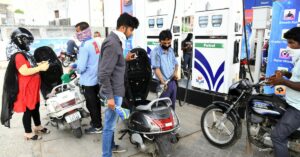2.9 Lakh Await Justice: Meet the Orgs Providing Free Legal Aid to Needy Undertrials
Of the over 4 lakh prisoners in Indian jails, nearly 2.9 lakh pre-trial detainees and undertrials have been languishing for years as they await justice. But their voices are now being heard, thanks to these people.
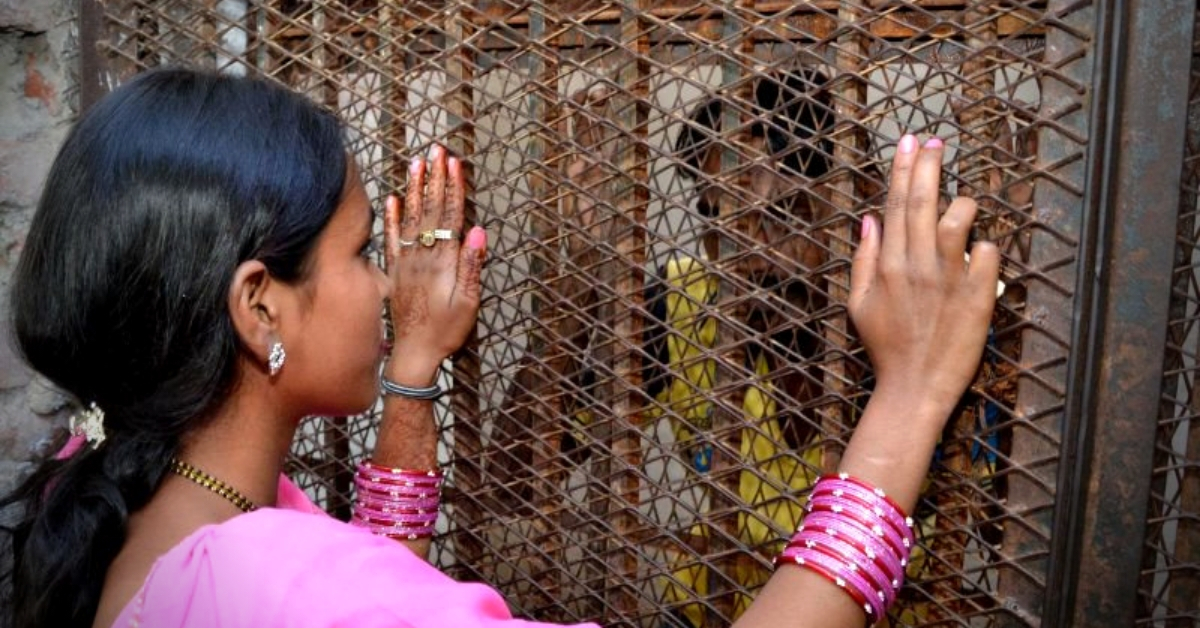
He took a single step out of the tall metal door and embraced his new life. After years of waiting and languishing behind the iron bars, he was finally free.
This is the story of the under-trials of Indian prisons who have been untouched by the hand of justice. More than 2.93 lakh continue to crowd 1,401 jails in India, all waiting for the promised legal aid.
For years, this has been a long and hopeless tarry for many, despite the provision of Article 39A of the constitution, which secures the right for an Indian citizen to get free legal aid.
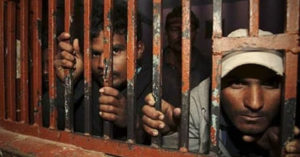
But, how are undertrials any different from other prisoners?
By definition, an undertrial is an unconvicted prisoner who has been detained to stay in prison during the period of trial or investigation for the offense that they been accused of committing.
Until the trial is complete and the judgement is passed, they cannot be considered convicted or guilty of the crime.
Many Indian jails also detain people at the pre-trial stage, along with the undertrials.
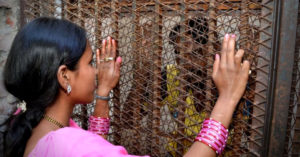
But, the distinction between the two lies in the fact that a pre-trial detainee has been imprisoned based on reasonable suspicion of an offense, but an undertrial prisoner already has a chargesheet filed against them, thus naming them as an accused.
Nevertheless, both are completely different from other prisoners who have already been proven guilty and sentenced to their respective period of imprisonment.
The problem lies in the implementation, where the line of distinction fades; many do not receive proper legal assistance, they spend years in waiting, and sometimes their entire lives pass by without a fair trial.
The outcome
Owing to this, not only is justice delayed, but the limited spaces of Indian jails remain overburdened with prisoners.
Overcrowding of jails has been a major problem in India, with more than four lakh prisoners living within the limited spaces of only 1,401 jails, as per the National Crime Records Bureau (2015).
In March 2018, a bench of Justices Madan B Lokur and Deepak Gupta, criticised the condition of overcrowding of Indian prisons. It stated, “This is extremely unfortunate and clearly suggests complete lack of commitment of state governments and UTs to the human rights of prisoners and also indicates the failure of under-trial review committees to take their responsibility seriously.”
The solution and its impact
But, a few Indian organisations and institutes point out that the change might be slow, but is indeed steady.
One of them, the National Legal Services Authority (NALSA), in 2017, took up the mantle to provide legal aid to the poorest of the poor, who have been spending years behind bars, unable to afford an advocate.
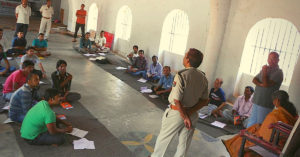
The plan launched by the former executive chairman of NALSA and ex-Chief Justice of India, Justice Dipak Misra, included a total mapping of the prisoners in 1,401 jails, by digitisation of the data. This would eventually assist in the identification of all those who had not been able to engage a lawyer.
Speaking to The Better India, director of NALSA, Sunil Chauhan, says, “By law, every prisoner is entitled to free legal aid, but the lack of awareness on the ground level, often creates a gap. But after putting in a systematic approach to remedy, we have achieved good progress on this front.”
He continues, “Now, with the help of state and district legal services authorities, we have been extending legal assistance through 1,128 Jail Legal Services Clinics situated in the jails. Professionals and paralegal volunteers regularly visit these clinics to offer their expertise where it’s needed the most. And now, 700 of them have been digitalised, making it more easy for the prisoners to keep track of the status of their case.”
As part of the project, NALSA has been organising a video conferencing facility between the prisons and the legal aid establishment in each state legal services authority. This enables paralegal volunteers and lawyers to keep in regular touch with the undertrial prisoners.
Till date, 1,63,655 inmates have been provided with legal assistance by NALSA, and 2,55,836 more, through the clinics.
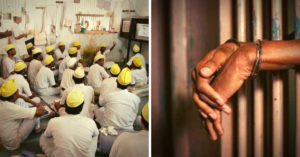
In addition to this, NALSA has also been holding awareness campaigns across the country to propagate crucial information about the legal rights of prisoners.
In 2018, the body conducted two such campaigns, with one extensively focused on the state of women prisoners in Indian jails and how it can be improved. Owing to this, a total of 2,942 women inmates were provided with legal aid during the campaign. To ensure their rehabilitation, almost 5,000 female inmates were also provided with various vocational training courses.
Narrating one of the success stories at the campaign, the director said, “Sunita (name changed) was an undertrial prisoner from Prakasam District, Andhra Pradesh, who has been in remand since May 2018. Even her husband is in jail in connection to the same crime. But, at the campaign, it was revealed that with parents in detention, their three children, all under the age of 14, were left without care. It was then, with the help of our team, the secretary, DLSA of Prakasam District, and a few NGOs, that the children were finally located and brought to safety. They have been given a proper shelter and enrolled in a school.”
Further, to ensure that the incarceration does not exceed the period of imprisonment, a pan-India campaign was also carried out in October-November 2018.
Similarly, Pune’s Symbiosis Law School (SLS) launched its Community Legal Care center for the same purpose in 2009.
Also Read: Jailed for Life, 50 Prisoners in Bengaluru Jail Get a Second Chance
Coordinating with district legal service authorities, the center has been assisting undertrial prisoners who have been charged for bailable offenses, to get bail.
“There have been a number of success stories, even in cases where some prisoners had been in jail despite completing their period of incarceration or even after being acquitted,” an official requesting anonymity shares.
The case of a 33-year-old from Ramanagram district was similarly pushed towards justice by Amnesty International’s Undertrial Justice Project. Despite being acquitted from the 14 theft cases in 2011, he still spent four-and-a-half years in imprisonment at Bengaluru’s Central Jail and was finally freed in 2014.
A professor and a member of the community legal care center, Professor Shirish Kulkarni, at SLS, says, “Our work does not end at just providing them with the needed legal aid, but starts from there, to ensure that they are properly rehabilitated. For that, we have been conducting special skill training sessions inside Yerwada Jail. Once they’re out, our team continues the follow-up to ensure a smooth transition into their regular lives.”
Also, one of the major focus areas at the center is the situation of women prisoners.
“Especially inside the prisons, the living conditions and the health hazards of women prisoners is a matter of serious concern. So, the team, with the help of Symbiosis Centre of Health Care, organises free health campaigns, spreading awareness about menstrual health as well,” adds Prof Kulkarni.
But their team comprises not just legal professionals, but law students as well.
Also Read: Jailed By the British, Rajasthan’s First CM Fought For the Rights of The Disenfranchised
“Based on their inclination toward the matter, every year, we select a team of students who assist us in the cases and other initiatives at the center, giving them the much-needed real-world exposure,” says Prof Kulkarni, who specialises in Clinical Law.
With their incessant efforts, these institutes not only safeguard the fundamental right of the prisoners to a fair and speedy trial, or bring reforms to the congested Indian prisons, but change lives by upholding the scepter of justice, especially for those who need it the most.
(Edited by Shruti Singhal)
Like this story? Or have something to share?
Write to us: [email protected]
Connect with us on Facebook and Twitter.
This story made me
- 97
- 121
- 89
- 167
Tell Us More
We bring stories straight from the heart of India, to inspire millions and create a wave of impact. Our positive movement is growing bigger everyday, and we would love for you to join it.
Please contribute whatever you can, every little penny helps our team in bringing you more stories that support dreams and spread hope.






